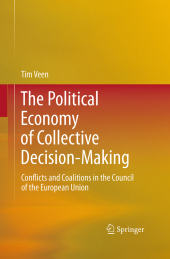 Neuerscheinungen 2014Stand: 2020-02-01 |
Schnellsuche
ISBN/Stichwort/Autor
|
Herderstra▀e 10
10625 Berlin
Tel.: 030 315 714 16
Fax 030 315 714 14
info@buchspektrum.de |

Tim Veen
The Political Economy of Collective Decision-Making
Conflicts and Coalitions in the Council of the European Union
2011. 2014. xviii, 199 S. 20 Tabellen. 235 mm
Verlag/Jahr: SPRINGER, BERLIN; SPRINGER BERLIN HEIDELBERG 2014
ISBN: 3-642-42901-7 (3642429017)
Neue ISBN: 978-3-642-42901-9 (9783642429019)
Preis und Lieferzeit: Bitte klicken
Here is the first book-length assessment of who gets what, when, and how in the Council of the European Union. The book analyzes a fresh, ten-year data set on decision making in the council that yields challenging new insights into the processes involved.
The Council of the European Union is the institutional heart of EU policy-making. But ┤who gets what, when and how┤ in the Council? What are the dimensions of political conflict, and which countries form coalitions in the intense negotiations to achieve their desired policy outcomes? Focussing on collective decision-making in the Council between 1998 and 2007, this book provides a comprehensive account of these salient issues that lie at the heart of political accountability and legitimacy in the European Union. Based on a novel and unique dataset of estimates of government policy positions, salience and power in influencing deliberations, an explanatory model approximating the Nash-Bargaining solution is employed to predict the policy outcomes on ten policy domains of central importance to this institution. The book┤s analyses comprise investigations into the determinants of decision-making success, the architecture of the political space and the governments┤ coalition behavior.
Preface.- 1 Introduction.- 2 Analysing Council Decision-Making.- 3 Power, Position and Salience.- 4 Dimensionality and Nature of Conflict.- 5 Coalitions in the Council.- 6 Winners and Losers of Decision-Making.- 7 The Council: Conflict and Coalitions.- References.
Tim Veen studied International Relations & International Organization at the University of Groningen, The Netherlands. He completed this course cum laude with a Masters degree in 2007. From 2007 to 2010, he was a PhD-fellow in the Methods and Data Institute of the University of Nottingham. In 2010, he has been inferred upon honorary membership in Phi Sigma Omega, the honors society of policy scholars and worked as a policy consultant for the OECD.


